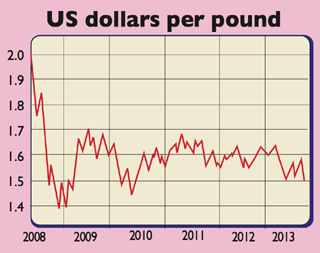Get the latest financial news, insights and expert analysis from our award-winning MoneyWeek team, to help you understand what really matters when it comes to your finances.
You are now subscribed
Your newsletter sign-up was successful
Want to add more newsletters?

Twice daily
MoneyWeek
Get the latest financial news, insights and expert analysis from our award-winning MoneyWeek team, to help you understand what really matters when it comes to your finances.

Four times a week
Look After My Bills
Sign up to our free money-saving newsletter, filled with the latest news and expert advice to help you find the best tips and deals for managing your bills. Start saving today!
The pound is "arguably the most vulnerable currency in the world alongside the yen", says Stewart Cowley of Old Mutual Global Investors. It's certainly been behaving that way. Last week it fell to a three-year low below $1.50 against the US dollar, taking its losses against the greenback this year to 10%. Against the euro it has fallen to a four-month low.
Further declines against the dollar look likely. The key reason is the "relative divergence of monetary policies", says Dagnar Dvorak of Baring Asset Management. In Britain, monetary policy is loose. The new Bank of England governor, Mark Carney, has indicated that it could well be loosened further.
While inflation in Britain is hardly benign at just under 3%, the reading for June was a little lower than markets had expected, giving Carney some room for manoeuvre. Meanwhile, in America the central bank is aiming to start winding down its money-printing programme, albeit very gradually, so the bias is no longer towards loosening.
MoneyWeek
Subscribe to MoneyWeek today and get your first six magazine issues absolutely FREE

Sign up to Money Morning
Don't miss the latest investment and personal finances news, market analysis, plus money-saving tips with our free twice-daily newsletter
Don't miss the latest investment and personal finances news, market analysis, plus money-saving tips with our free twice-daily newsletter

That, along with a stronger economic recovery in America, implies an eventual rise in the central bank's benchmark interest rate, which is already being anticipated by slowly rising market interest rates.
Inflation-adjusted interest rates are key for foreign-exchange investors, and these are far more attractive in America than in Britain. Britain's are the most negative in the G10, according to Morgan Stanley, while in America real rates are on the rise.
There are other reasons to expect sterling weakness. Britain's current-account deficit is at near-record levels, while America is set to improve its current-account position. Gas fracking is boosting productionand will allow America to shrink its energy trade deficit, which accounts for 40% of its total trade balance, according to Lombard Odier, a private bank. The improving deficit should also foster dollar bullishness.
The downside for the euro against the US dollar looks even greater, given the recession in the region and scope for further crises, suggests consultancy Capital Economics. The yen is also fragile, given the Bank of Japan's apparent determination to do whatever it takes to create annual inflation of 2%, which means it is likely to keep printing money rapidly.
Morgan Stanley is pencilling in a 7% slide in sterling against the dollar over the next few months, with the rate reaching $1.41 by the end of the year.
Get the latest financial news, insights and expert analysis from our award-winning MoneyWeek team, to help you understand what really matters when it comes to your finances.
MoneyWeek is written by a team of experienced and award-winning journalists, plus expert columnists. As well as daily digital news and features, MoneyWeek also publishes a weekly magazine, covering investing and personal finance. From share tips, pensions, gold to practical investment tips - we provide a round-up to help you make money and keep it.
-
 Should you buy an active ETF?
Should you buy an active ETF?ETFs are often mischaracterised as passive products, but they can be a convenient way to add active management to your portfolio
-
 Power up your pension before 5 April – easy ways to save before the tax year end
Power up your pension before 5 April – easy ways to save before the tax year endWith the end of the tax year looming, pension savers currently have a window to review and maximise what’s going into their retirement funds – we look at how

